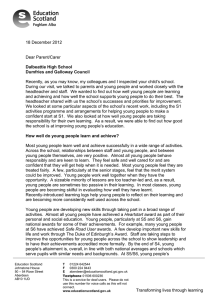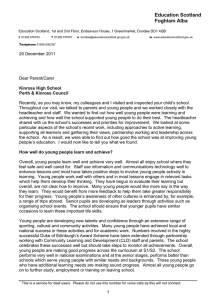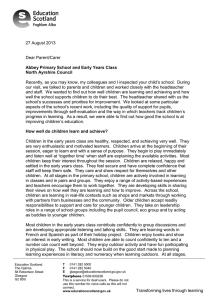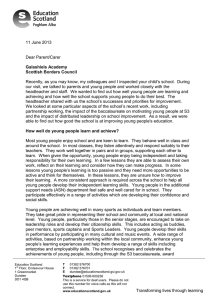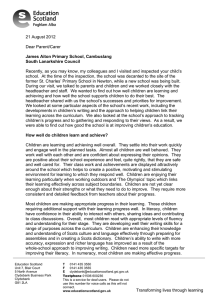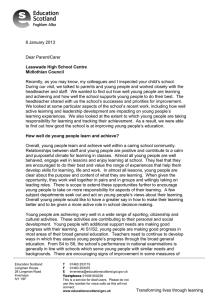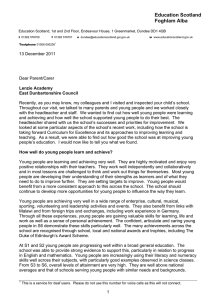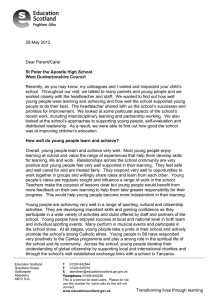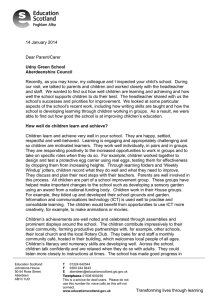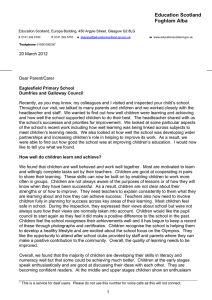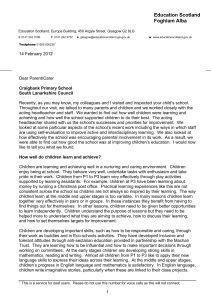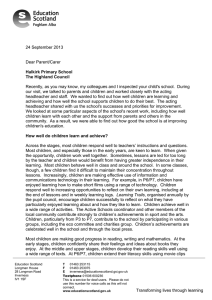22 May 2012 Dear Parent/Carer
advertisement
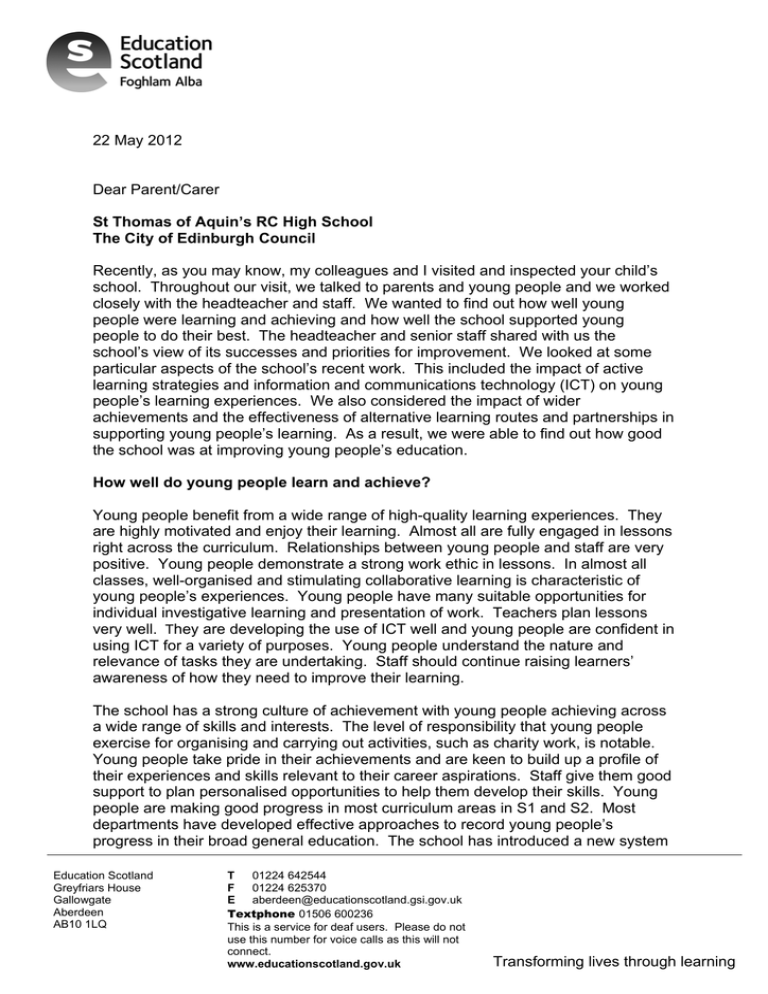
22 May 2012 Dear Parent/Carer St Thomas of Aquin’s RC High School The City of Edinburgh Council Recently, as you may know, my colleagues and I visited and inspected your child’s school. Throughout our visit, we talked to parents and young people and we worked closely with the headteacher and staff. We wanted to find out how well young people were learning and achieving and how well the school supported young people to do their best. The headteacher and senior staff shared with us the school’s view of its successes and priorities for improvement. We looked at some particular aspects of the school’s recent work. This included the impact of active learning strategies and information and communications technology (ICT) on young people’s learning experiences. We also considered the impact of wider achievements and the effectiveness of alternative learning routes and partnerships in supporting young people’s learning. As a result, we were able to find out how good the school was at improving young people’s education. How well do young people learn and achieve? Young people benefit from a wide range of high-quality learning experiences. They are highly motivated and enjoy their learning. Almost all are fully engaged in lessons right across the curriculum. Relationships between young people and staff are very positive. Young people demonstrate a strong work ethic in lessons. In almost all classes, well-organised and stimulating collaborative learning is characteristic of young people’s experiences. Young people have many suitable opportunities for individual investigative learning and presentation of work. Teachers plan lessons very well. They are developing the use of ICT well and young people are confident in using ICT for a variety of purposes. Young people understand the nature and relevance of tasks they are undertaking. Staff should continue raising learners’ awareness of how they need to improve their learning. The school has a strong culture of achievement with young people achieving across a wide range of skills and interests. The level of responsibility that young people exercise for organising and carrying out activities, such as charity work, is notable. Young people take pride in their achievements and are keen to build up a profile of their experiences and skills relevant to their career aspirations. Staff give them good support to plan personalised opportunities to help them develop their skills. Young people are making good progress in most curriculum areas in S1 and S2. Most departments have developed effective approaches to record young people’s progress in their broad general education. The school has introduced a new system Education Scotland Greyfriars House Gallowgate Aberdeen AB10 1LQ T 01224 642544 F 01224 625370 E aberdeen@educationscotland.gsi.gov.uk Textphone 01506 600236 This is a service for deaf users. Please do not use this number for voice calls as this will not connect. www.educationscotland.gov.uk Transforming lives through learning for tracking and monitoring young people’s progress across most curriculum areas until the end of S3. This helps staff identify young people who may need additional support in their learning. By the end of S4, young people’s attainment in SQA qualifications has been consistently above or well above the national averages. By the end of S6, young people’s performance has been consistently well above the national averages. Overall, their performance has been much better than schools serving young people with similar needs and background. In the last three years, an increasing number of young people have been moving on to higher and further education. How well does the school support young people to develop and learn? The school effectively supports all young people to develop and learn. In almost all lessons, young people complete the tasks and activities successfully. In most lessons, the pace of learning is appropriate and in a few lessons it is brisk. Most young people feel that they are being challenged in their learning and that they are supported effectively by all their teachers. Young people of all abilities are encouraged to do the best they can and feel successful as a result. The school is very inclusive. Young people with a range of additional support needs are included fully in class activities. Learning support assistants give very good support to these young people in mainstream classes and are deployed effectively. More work could be done to involve young people in planning their own progress. The school should review the practices of pupil support staff in helping young people in their learning. Overall the curriculum meets young people’s needs effectively. Across the school, staff are embedding their approaches to developing young people’s literacy and numeracy skills successfully within lessons. At S1/S2, young people benefit from relevant and useful coursework which helps them develop a broad knowledge and skills base and prepares them well for national qualifications. Some areas of the curriculum need to provide a more coherent learning experience for young people with better progression as they move from S1 to S6. The school now has plans in place to address these areas of the curriculum, including the implementation of the recommended time for religious education. At S3 to S6, young people experience a wide range of courses leading to national qualifications and other awards which enhance their learning. At S5 and S6, young people volunteer for extra work within the school and the wider community. These and related activities are developing young people’s life skills. The school has established successful partnerships with local schools, further education colleges and the community to provide young people with choices to study other subjects. It has well-established links with primary schools and should develop these further across the curriculum. How well does the school improve the quality of its work? The school is strongly committed to improving the quality of young people’s learning experiences. It has clear evidence of improvements as a result of self-evaluation approaches. Across the school, learning and teaching is more stimulating and active, young people are involved more in their learning and tasks and activities are more challenging. The headteacher provides very strong and effective leadership and has a very clear vision for improving the school. She has developed practices that have improved the quality of young people’s learning experiences and staff’s 2 teaching approaches. The depute headteachers and heads of departments are contributing effectively to school improvements. The ‘Practitioners Research Team’ lead the ‘Sharing Excellence Rounds’ where teachers have observed learning and teaching across the school. This has helped teachers to share good practice and reflect on how they can help young people learn better. Young people are taking on roles of responsibility which help develop their leadership qualities and social skills. The school has established systematic approaches to track and monitor young people’s performance across the school. These are helping ensure that young people are making appropriate and relevant progress in their learning. Staff have participated in ‘Cluster Learning Rounds’ and are working with their primary schools to organise joint activities for sharing good practice. This inspection of your school found the following key strengths. • • • • • • Polite, motivated and responsible young people. The overall quality of young people’s learning experiences, progress and achievements. The school’s systematic approaches for improving the quality of its work. The inclusive, nurturing learning environment built on values of the faith community. The leadership of staff and young people in improving the school. The impact of the headteacher’s leadership. We discussed with staff and the education authority how they might continue to improve the school. This is what we agreed with them. • • • Continue to develop the curriculum in line with Curriculum for Excellence. Review the practices of pupil support staff in helping young people in their learning. Implement the school’s plans which are in place to meet the national requirements for religious education in denominational schools. What happens at the end of the inspection? We are satisfied with the overall quality of provision. We are confident that the school’s self-evaluation processes are leading to improvements. As a result, we will make no further visits in connection with this inspection. The local authority will inform parents about the school’s progress as part of the authority’s arrangements for reporting to parents on the quality of its schools. Hakim Din HM Inspector 3 Additional inspection evidence, such as details of the quality indicator evaluations, for your school can be found on the Education Scotland website at www.educationscotland.gov.uk/inspectionandreview/reports/school/primsec/StThom asOfAquinsHighSchoolEdinburghCity.asp. Please contact us if you want to know how to get the report in a different format, for example, in a translation. You can contact us at enquiries@educationscotland.gsi.gov.uk or write to us at BMCT, Education Scotland, Denholm House, Almondvale Business Park, Almondvale Way, Livingston EH54 6GA. If you want to give us feedback or make a complaint about our work, please contact 01506 600200, or write to us at the above address or e-mail: feedback@educationscotland.gsi.gov.uk. 4
